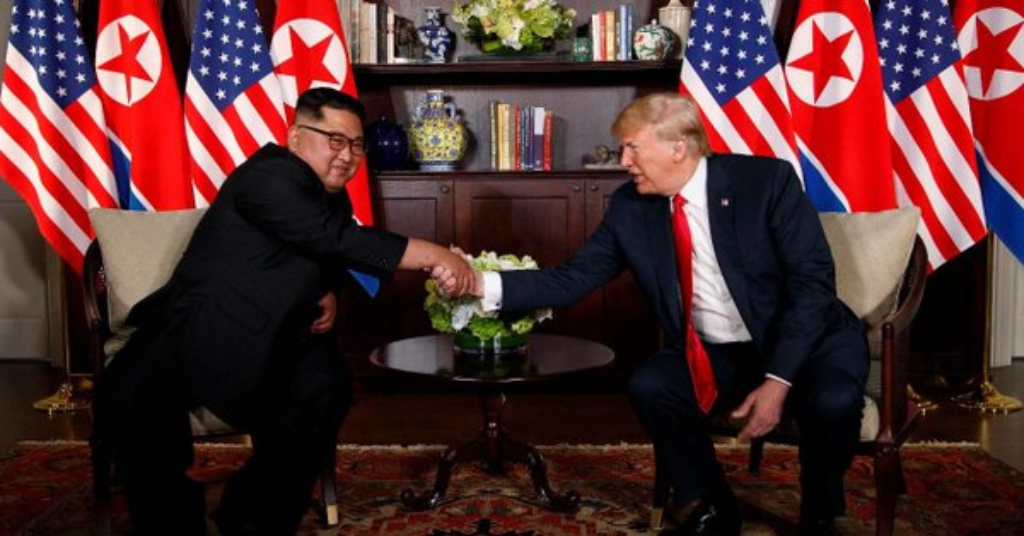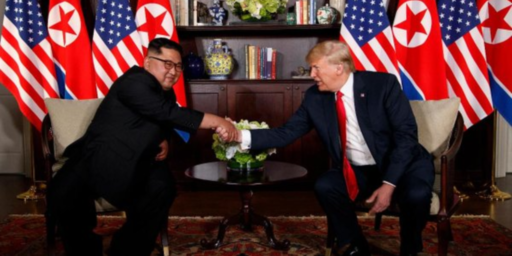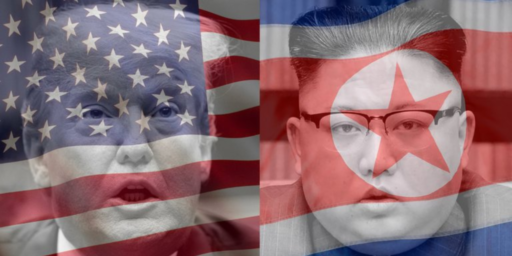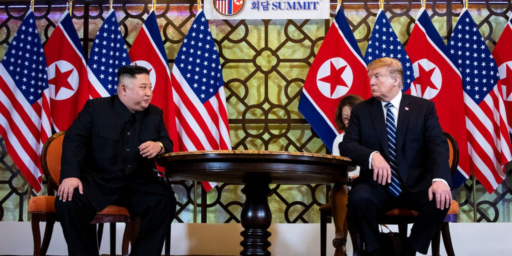Trump And Kim Headed To Second Summit. It’s Unlikely To Accomplish Anything.
President Trump and Kim Jong Un hold their second summit in Hanoi later this week, but it's unlikely anything significant will happen.

As I write this, President Trump is on the long journey that will take him to Hanoi for his second summit with North Korean leader Kim Jong Un. As was the case nine months ago, the President heads to this meeting with high hopes in mind but little sign that this second meeting will be any more substantive than their first meeting last June in Singapore:
HANOI — His intelligence chiefs warn that North Korea is unlikely to surrender its nuclear weapons. His advisers fret that a breakthrough could prove elusive and that he might make an impulsive concession to score headlines. And his allies around the world worry he could get easily outmaneuvered.
Yet, President Trump is steadfast in his determination to meet face-to-face here this week with Kim Jong Un, aides say, because he has an unwavering faith in the power of the pen-pal relationship he has cultivated with the North Korean leader not only to bend the course of history, but to shape his own legacy.
“It’s a very interesting thing to say, but I’ve developed a very, very good relationship,” Trump said Sunday in remarks to the nation’s governors. “We’ll see what that means. But he’s never had a relationship with anybody from this country, and hasn’t had lots of relationships anywhere.”
The two men will enter their second summit together on Wednesday as unorthodox leaders who are both distrustful of the global establishment, eager to project dominance and determined to maximize their power.
They are worlds apart — Trump is a septuagenarian mogul who fancies himself capitalism’s golden progeny; Kim is a millennial strongman whose ruthless rule leaves his citizens impoverished and his adversaries off-balance.
But since their historic first meeting in Singapore last June, the two leaders have each adopted a strategy of playing to the other’s ego with gushing and gratuitous adoration in pursuit of their aims: For Trump, North Korea’s denuclearization; for Kim, its economic revival and respect on the world stage.
Trump gloats about the half dozen or so letters Kim has written him as if he were a smitten teenager in possession of valentines from a crush. White House officials refer to the diplomatic correspondence jokingly as “love letters.” Kim addresses Trump as “Your Excellency” and employs flowery language to describe the president’s energy and political smarts, according to people who have read them. Trump has shown the documents to dozens of Oval Office visitors and bragged about them in public.
“He wrote me beautiful letters — and they’re great letters,” Trump said in September at a rally in West Virginia. “We fell in love.”
At the United Nations General Assembly later that month, Trump waxed about his budding relationship with Kim: “He likes me, I like him. We get along. He wrote me two of the most beautiful letters. When I showed one of the letters — just one — to [Japanese] Prime Minister Abe, he said, ‘This is actually a groundbreaking letter.'”
Trump continued, “It is a historic letter. It’s a beautiful piece of art. And I think we’re going to make a deal.”
Trump has responded to Kim with his own mash notes, raving about how much he enjoys his company and vowing to make history together, according to White House officials who spoke on the condition of anonymity to describe private documents.
Although they credit Trump with forging a warmer rapport with the North Korean leadership than any other American president, experts in U.S.-North Korea relations are skeptical that the relationship will result in denuclearization or peace.
“Personal chemistry between leaders is clearly important,” said Victor D. Cha, the top North Korea adviser in the George W. Bush administration.
But, he added, “Is that personal relationship enough to create success in the policy? We are so far apart that the notion that the friendship alone would create a North Korean decision to give up all of their nuclear weapons is very hard to imagine.”
Absent from Trump’s messaging on North Korea over the past year has been any mention of human rights. The savagery of Kim and his government has been well documented and was once a rallying cry for Trump. The president shared the story of Ji Seong-ho, a North Korean activist who defected to South Korea, in his 2018 State of the Union address as an emotional call to rid the world of tyranny and brutality.
But over the past year, Trump has said little publicly about Kim’s barbarism, and officials said that in private the president has told confidants that he considers human rights in North Korea largely inconsequential to striking a denuclearization deal.
“Trump has really virtually no interest in the internal affairs — and human rights, in particular — of other regimes around the world,” said Ian Bremmer, president of the Eurasia Group and a foreign affairs expert. “The transactionalism of Trump means that he is much more unfettered in being able to consider a back-and-forth with Kim Jong Un that no other leader would have. Returning salutes to a North Korean leader, for example, and talking about how much of a pal he is and how Kim Jong Un is smart. Trump doesn’t talk about concentration camps and assassinations and mass starvation and forced labor.”
Bremmer was referencing Trump’s salute of a North Korean military general during the summit in Singapore, which was documented in a North Korean propaganda video and drew criticism in the United States.
Trump’s own advisers, meanwhile, are downplaying the possibility of a significant breakthrough:
[A]dministration officials said they expect Trump’s second summit with Kim will produce incremental progress, including, perhaps, arriving at an agreed upon definition of denuclearization and laying out a timetable for future negotiations for North Korea to freeze its nuclear weapons and missile programs.
“The president’s not in a hurry, particularly as long as things continue to move forward in a positive manner and as long as the conversations continue to go well,” White House press secretary Sarah Sanders said on Fox News. “We’ll see what happens. I think that the only one setting high expectations is probably the media because they’re looking for reasons to attack this president. They hate the idea that he’s done so well on something his predecessors couldn’t do anything on.”
Aides said Trump is planning to try to pitch Kim on his vision for economic prosperity in North Korea should the reclusive state open itself to the world. This is a theme he hit on in Singapore, where Trump said he complimented Kim on the country’s topography and its potential as a resort destination.
“They have great beaches,” Trump told reporters at the conclusion of the Singapore summit. “You see that whenever they’re exploding their cannons into the ocean, right? I said, ‘Boy, look at the view. Wouldn’t that make a great condo behind?’ And I explained, I said, ‘You know, instead of doing that, you could have the best hotels in the world right there.’ Think of it from a real estate perspective.”
Trump has continued to play up North Korea’s economic potential. He said earlier this month, “Their location between South Korea and then Russia and China — right smack in the middle — is phenomenal.”
While there has been some talk about this second meeting resulting in a “grand bargain,” the odds of this happening given what we’ve seen since June seems to be fairly low, and the fact that the President’s own advisers are downplaying expectations for the meeting suggests that there’s been very little groundwork laid for the kind of groundbreaking summit that the President’s rhetoric suggests. One possibility that could emerge from the meeting is an agreement to finally negotiate a formal peace treaty ending the Korean War to replace what effectively is just a cease-fire that has lasted for the past sixty-six years. Such an agreement, though, would require the participation of the other combatants involved in the war, namely South Korea and China. Therefore, any such agreement would at best be aspirational. Far less likely is the kind of agreement on denuclearization that the Administration, and specifically the President, continues to tout as the ultimate goal in the ongoing negotiations with the DPRK.
As Jennifer Rubin notes, Trump’s gullibility when it comes to North Korea, especially the delusion that “denuclearization” as the United States understands it is a realistic goal at this point, pretty much guarantees that little will be accomplished at this meeting:
One would like to believe Trump is attempting to snow Kim Jong Un, a foolish and ineffective approach to a hardened dictator with distinct ideology and a clear mission. However, it is much worse: As we saw at the Singapore summit, Trump is fooling himself, imagining his personal charm bears concrete results.
Trump’s delusional mind-set makes him a sitting duck for Kim to trade flattery (of Trump) for concessions (from Trump). Kim already achieved a level of respectability no other North Korean leader has attained — without a single meaningful and irreversible concession — simply by virtue of a summit that turned into a PR coup.
No wonder so many Senate Democrats would sign onto a letter expressing horror at how the last summit went (“The Singapore meeting gave Kim — the leader of perhaps the world’s most repressive regime — legitimacy and acceptance on the global stage while effectively undermining our policy of maximum pressure and sanctions, which now appear to be in the process of showing strain, and putting at risk vital alliance relationships.”) and warning the Trump White House not to repeat the diplomacy of flattery and self-delusion:
We hope you will execute a serious diplomatic plan, which includes a sequenced process to verifiably freeze and roll back North Korea’s nuclear weapons and missile programs in conjunction with continued appropriate sanctions and other pressure; a robust deterrence posture; strengthened alliances; intensified diplomatic and economic engagement; and a deepening of North-South dialogue that over time can provide the pathway to full denuclearization and a durable peace agreement.
Part of the problem is Mike Pompeo, who, both now as secretary of state and previously as CIA director, knows North Korea has not changed its behavior or intentions. He nevertheless continues to indulge Trump’s ego, spinning the results of the most recent summit to the point of misleading lawmakers about the extent of negotiating progress. This time around, Congress should be aware that Pompeo’s word means little, and vague promises and timetables are worthless.
After the first meeting between Kim and Trump, both parties claimed significant progress had been made between the two nations. Very quickly, though it became apparent that the meeting was little more than a photo opportunity that did more to boost Kim’s standing in the world. Despite that, President Trump claimed that North Korea was no longer a nuclear threat to the United States, even though the reality of what had actually occurred was far less substantial. To some extent, I suppose the summit was productive in that the two nations have continued talking. However, there have been long pauses in between those talks and several occasions on which it seemed as though the North Koreans were giving up on the process due to what they claimed was a “gangster-like” attitude on the part of American negotiators. It’s possible, of course, that there has been progress behind the scenes that we don’t know about, but it has not manifested itself publicly at this point. In fact, what we’ve seen belies the claim that there was any real progress at all.
This became apparent immediately after the summit as North Korea took steps that made it clear that there had been no real agreement by the North Koreans to “denuclearize” in the manner that the United States understands it. Within weeks after the summit, for example, it was reported that North Korea was increasing production of the fuel needed to make additional nuclear weapons and that it was concealing the existence of ongoing nuclear weapons research at secret facilities well hidden from both surveillance and, most likely, the ability of the United States to take the sites out in a military strike. Additionally, it became apparent in the days after the summit that the much-publicized destruction of the DPRK’s primary nuclear weapons test site, a much-hyped pre-summit event that was witnessed by American and other international journalists, was much less than met the eye and that the site could easily be rebuilt if needed in the future. Weeks later, we learned that the DPRK had also begun work on the construction of new ballistic missiles at yet another secret site.
So now here we are on the verge of a second summit between that two leaders and it’s obvious that the reality of what had been accomplished at the first summit did not meet the rhetoric. The actions that the DPRK has engaged in are not what one would expect from a nation that had agreed to “denuclearization” in the sense of giving up their existing nuclear weapons program. Additionally, analysts who have seen satellite images say that the DPRK has made a second large nuclear reactor operational. This type of reactor is capable of making plutonium which is, of course, one of the main fuels used in the production of nuclear weapons. This new reactor can reportedly make four times as much plutonium as North Korea’s current reactor, which has been the source for the plutonium needed for its nuclear arsenal to date.
Perhaps most significantly, over the past nine months or so, the North Koreans have quite often returned to some of the same confrontational rhetoric that they’ve engaged in before the summit. In December, for example, DPRK officials once again made clear what they meant by denuclearization, and it’s something far different from what the United States and even the South Koreans mean. From the American perspective, of course, “denuclearization” means that the primary goal of these current talks, indeed perhaps the only goal, is for the DPRK to give up its nuclear weapons, its weapons research program, and its ballistic missile program. This is unlikely to happen simply because the existence of a nuclear arsenal that some American intelligence analysts suspect could already number as much as more than sixty nuclear devices that, while not as powerful as a fusion-based thermonuclear device, could still cause widespread destruction in South Korea and Japan if they were ever unleashed, is perhaps the best deterrent available to guarantee the survival of the Kim regime.
For the North Koreans, and perhaps also their allies in Beijing, though, “denuclearization” means the removal of all American troops from South Korea if not the entire region, including Japan, and the lifting of the so-called nuclear umbrella that the United States has in place which essentially reserves the right to use nuclear weapons in response to any attack on its allies in Seoul, Tokyo, or elsewhere in the region. The Trump Administration either seems to not understand this fundamental difference in goals or, at least in its public statements, refuses to recognize that it exists. Kim Jong Un drove this point home during his New Year’s Day address in which he stated that his country would move forward with its nuclear weapons program unless sanctions against his country were lifted. This is an option that would simply be unacceptable and unwise for the United States to agree to at a time
Given all of this, the odds that the Hanoi Summit will be any more successful at producing something significant than the Singapore Summit are fairly low from the American point of view. There’s no indication that the North Koreans have agreed to anything approaching the kind of deal that the President claims he can get out of these summits. Instead, what we’re likely to see is another meeting in which we get very little while Kim gains further legitimacy as a world leader just from the fact that he’s getting a meeting with the President of the United States. In the past, meetings like this were not scheduled unless and until the parties had agreed in advance to something significant that both sides could point to. That didn’t happen in the lead up to the Singapore meeting and it seems unlikely that this meeting will be any different.





I’m not sure I’d like anything he’s likely to accomplish, whether in Hanoi or in the US.
Does Trump actually have any “allies around the world,” apart from a few genocidal ghouls such as Duterte, Putin, Erdogan, and Kim himself?
Ironic that Cadet Bone Spurs has finally mustered the courage to go to Vietnam.
I wonder if he will visit the Hanoi Hilton where McCain was held prisoner?
Or is he only going in order to get a $79 rub-and-tug from Kim, who he has fallen in love with.
Essentially Dennison has now given up, and is going to allow NoKo to be a nuclear power. Individual-1’s legacy is that he was the one who allowed Kim to have the ability to hit targets in the US with nukes.
So much winning…I’m tired of all the winning…
It’s too early to say the “summit” won’t accomplish anything. It may take attention away from Cohen’s testimony in Congress.
@Kathy:
Likely vice-versa? If Cohen provides the salacious details that are expected…no one will notice the “Two Lover’s Photo-Op” from Vietnam.
@Daryl and his brother Darryl:
I figured that Trump timed this hegira so he’d be on the other side of the world when Cohen starts spilling the beans.
If you lean that way, pray this accomplishes nothing. The alternatives are frightening.
Actually, word is the guys surrounding Trump are terrified that Trump will promise something over-the-top to Kim in exchange for standard NoKo waffle. Because they’re best buds, or something.
Trump really is a dumb-ass, isn’t he?
I’m just hoping he doesn’t try to forcibly kiss Kim, or grab him by the crotch.
I don’t think Kim is his type, at least not physically, but lots of people are attracted to power, and we see signs of that in Trump all the time.
(If Trump and Kim were to have a consensual relationship, I might roll my eyes, but that’s entirely their business. I don’t want the President of the United States sexually assaulting world leaders, or anyone for that matter.)
He must be going over there to personally tour the empty facilities where the North Koreans used to keep all their nukes.
@Concerned Citizen:
Yes, shame on Bush, Clinton, Bush, and Obama for not legitimizing a brutal dictator.
@Kathy:
Well, that didn’t work.
@Daryl and his brother Darryl:
Guys, thanks for beating me to the punch… but I’d like to join the ground swell of acclaim for Herr Trump in FINALLY going to Vietnam… five decades late, but hey, he finally found it on a map! And thanks to those of you who went when you were called to duty.
Well…nothing accomplished and the summit has ended ahead of schedule. Even as a photo op trip this was a fail. I honestly believe that our President was told to get his ass back to the states, like yesterday, so he can go on camera and try to make lemonade out of the lemons Cohen handed him today.